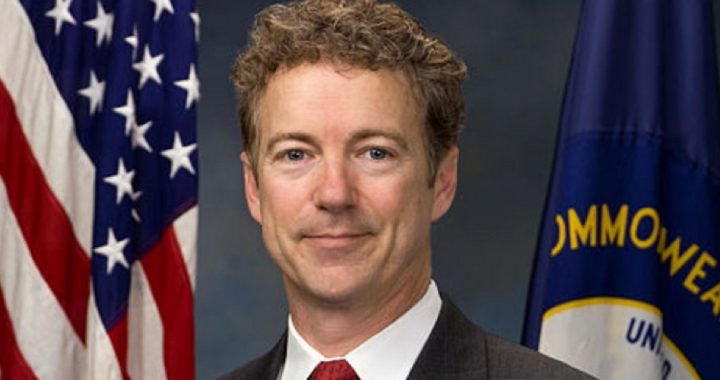
The story was told in the 1800s of a man in Illinois whose house burned down. All his neighbors said they were sorry for the man’s loss. One neighbor, however, took out a five-dollar gold piece and said, “I feel sorry for this man to the amount of five dollars. How much do you feel sorry for him?”
Senator Rand Paul (R-Ky.) understands the principle taught in this story.
At a press conference on Wednesday held in downtown Louisville, Kentucky, Paul announced that he was returning $600,000 to the U.S. Treasury. Paul saved this much money by “frugally operating his Senate office in the past year,” the Louisville Courier-Journal reports.
“It’s the only budget I control…. It’s not enough, but it’s a start,” Paul said.
The total amount being returned is more than 20 percent of Sen. Paul’s original office budget, according to information reported by the senator’s office.
He said his staff was able to curtail spending by “watching every purchase,” including, according to the Courier-Journal article, “keeping close tabs on expenditures for ‘computers, paper, ink cartridges. Everything we buy.’”
Paul also closely controls the money spent on traveling between Capitol Hill and Kentucky. Reports from congressional watchdog groups published online also indicate that Paul does not pay his staff the exorbitant salaries paid to aides by some of his colleagues.
The Courier-Journal reported, “We are frugal from top to bottom,” Paul said, adding that he believes the savings show he has been true to his campaign pledge to cut federal spending. “It’s not an enormous savings,” he said, but the savings would add up if purse strings were so closely watched throughout government.
This isn’t the first time the penny-pinching lawmaker has come in under budget and sent the surplus back to the government. Last year, Sen. Paul returned $500,000 to the Treasury. In total, Paul has contributed $1.1 million in money unspent from his operating budget since he took office in 2010.
“I ran to stop the reckless spending, and I pledged to the people of Kentucky that I would work to keep their hard-earned money out of the hands of Washington bureaucrats whose irresponsible spending has threatened our country’s economic health,” Sen. Paul said.
An article published in January 2012 by Politico revealed that Paul isn’t alone in cutting costs and returning funds to the federal treasury. According to the article by Scott Wong:
During the past three years, Sen. Richard Shelby has returned more money to taxpayers than any other senator — about 40 percent or $1.2 million a year — according to a POLITICO analysis of all Senate office budgets. Sen. Barbara Boxer has consistently given back the least: less than 1 percent each year.
The gulf between Shelby, an Alabama Republican, and Boxer, a California Democrat, reflects a philosophical divide in Congress about how much money lawmakers need to effectively represent their states and constituents as the debate rages over the proper size and scope of the federal government.
But the office budget stats don’t necessarily play to stereotypes about fiscal conservatives versus Big Government liberals. The most frugal senators after Shelby in fiscal years 2009 and 2010 were Daniel Akaka (D-Hawaii), who returned a combined 34.3 percent of his budget; Jim Risch (R-Idaho) at 25.1 percent; Sheldon Whitehouse (D-R.I.) at 23.6 percent; and Mike Enzi (R-Wyo.) at 23.5 percent.
Wong also reported that in fiscal years 2010-2011, Senate offices returned about $64 million to the national treasury. A thimble full of savings in the $16 trillion ocean of debt.
For his part, Senator Paul believes such cost cutting should be the law, and later this year he will offer a bill “incentivizing federal employees to identify and eliminate wasteful programs in their respective agencies.”
Joe A. Wolverton, II, J.D. is a correspondent for The New American and travels frequently nationwide speaking on topics of nullification, the NDAA, and the surveillance state. He can be reached at [email protected].



